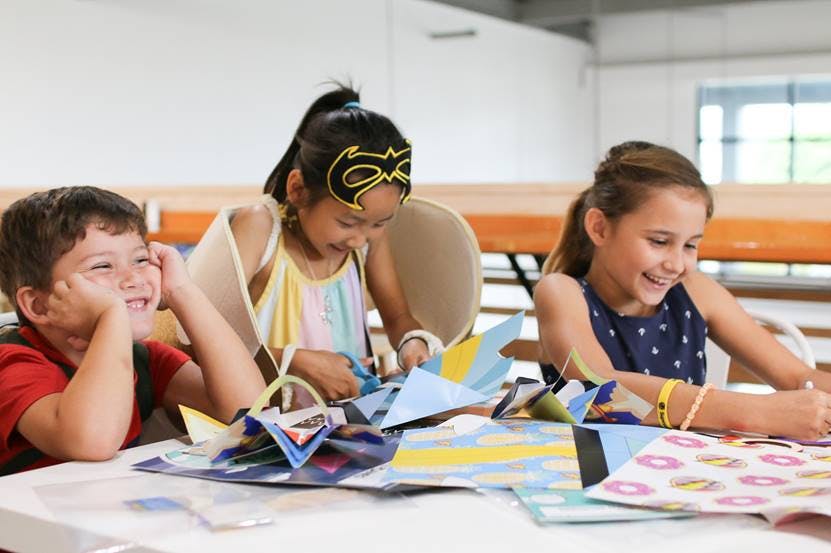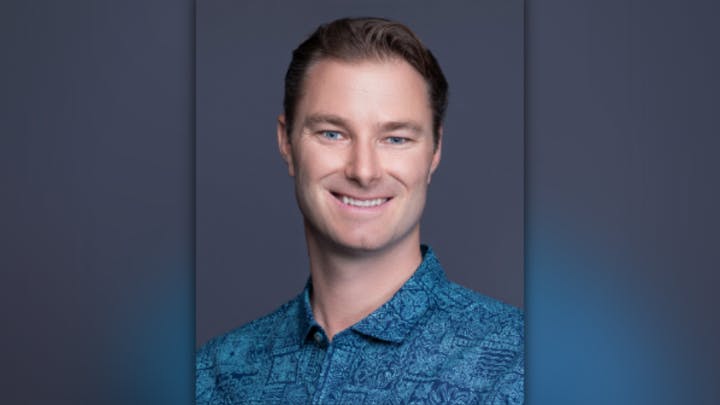
Children participate in a "secret mission" that promotes STEM, social, and emotional skills.
Photo courtesy Superpower Academy
After studying psychology at Stanford and law at UCLA, Pamela Joe, Cohort IV, started her career as a lawyer, then transitioned into the renewable energy industry and became an executive at Sopogy, Inc. and RevoluSun. Always wanting to “push the envelope,” Pamela yearned for a more creative outlet to help change the world.
As a mother of two, she became deeply interested in new psychological research that demonstrated a strong link between social and emotional learning (SEL) skills and lifelong success. As part of her Individual Learning Excursion (ILE), Pamela finally found her “secret mission.” In 2017, she created her own start-up called the Superpower Academy!
Hawaiʻi Leadership Forum (HLF): Tell us about Superpower Academy – what are you doing and how do you hope to make an impact?
Pamela Joe (PJ): Superpower Academy’s mission is to empower future leaders, innovators, and world-savers by promoting critical social and emotional growth. We intersect STEM, project-based learning and social and emotional skill-building for fun interactive curriculum for use at home and in classrooms. Kids are recruited to be “heroes in training.” They receive secret missions, which they must complete to earn superpowers and help save the world.
HLF: What was the spark that led to this journey you have been on? What personally motivated you to take on this work?
PJ: As I raised my first child and began learning about her aspirations, I became frustrated with the available role models. For example, as we combed the store aisles for Halloween costumes, she was offered only shiny and unrealistic princesses and unachievable superheroes. I started thinking, wouldn’t it be great if my daughter could draw inspiration from real heroes doing great work in our world and then use this to create her own fantastic identity? So, I decided to broaden the landscape of possibilities for our kids by creating something that empowers them to be their better self, rather than offering unattainable ways to be someone else.
HLF: How has your Omidyar Fellows (OF) experience and the Forum of Fellows (FoF) contributed to this journey? How do you envision it might contribute in the future?
PJ: Going through the OF program helped me to understand myself. While this sounds basic, many of us do not take the time to contemplate our strengths, weaknesses, and tendencies. For example, what gives us energy and what drains us? Which areas of work lend themselves to our personalities and which do not? This has not only helped me make decisions and frame “work,” but it has also helped me to understand past experiences. I realized that I am energized by idea generation, prototyping, and the market-disrupting stage of a business. In contrast, operational and administrative aspects are not within my “sweet spot,” and thus are draining.
HLF: How can the FoF contribute in the future?
PJ: FoF should keep the Fellow network strong and cohesive by continuing to bring us together. This can be accomplished by continuing to provide interesting and strong resources and opportunities to cross-pollinate. I can’t stress how many things have happened to move things along that were chance synergies with other Fellows (a result of the supportive culture OF and FoF has built). Any way in which FoF can continue with mentorship opportunities is valuable. We always need sage advice, sounding boards, and wisdom from those whom we respect.
HLF: What challenges have you faced? And how did you overcome or learn from them?
PJ: One of the biggest challenges is entering into a new industry – Education and Social and Emotional Learning (SEL) – in which I do not have much experience. Early on, one of the most important things I did was step into the shoes of one of my audiences by piloting Superpower Academy curriculum in elementary classrooms and teaching a Superpower Academy extended learning course every week for a semester. The insights I gained about the demands and stressors of teaching and what kids are like in the classroom are invaluable. They helped me to be sensitive in design (for both educators and students) and relate to my audience.
HLF: What would you consider a success you’ve experienced on this journey? And how could that success be replicated in other situations?
PJ: In less than two years, Superpower Academy boxes have reached kids in 46 states and many other countries! This gives me tremendous pride because the product is based on substantive content from Hawaiʻi, yet it is resonating with parents and educators across the nation. We are also in dozens of classrooms, which is exposing hundreds of students to SEL training every semester. A big accomplishment is confirmation that the lessons are sinking in. We’ve seen this through modified or expressed behavior (e.g. a child pausing to settle down, or a shy child raising her hand), reflective discussion, written student reflections, parent messages, and teacher testimonials. In fact, we’ve had an administrator consider Superpower Academy for four grade levels at her school based upon her conversations with the kids at open house. She was impressed that the kids could articulate what each lesson was about – even months after they had completed their activities. One key learning is to ask for feedback. In this case, it meant trusting in the wisdom of kids because they are so much wiser than we give them credit for, and they are blissfully unfiltered. If something is boring, they will tell you clearly and directly to your face. I learned so much from my kid testers.
HLF: How did it feel to leave a stable job and strike out on your own?
PJ: It’s funny because I’ve been moving so fast for the past eleven years, and this is the first time I’ve stopped to consider this question. I left any semblance of a stable job in 2008 when I moved from Goodsill Anderson (law firm) to become General Counsel of Sopogy, Inc., a VC-backed startup out of a warehouse by the airport. My husband and I had a very serious conversation as I considered the move, which involved things like, “The company could run out of money tomorrow,” “I could be fired at any moment,” “The market can change overnight and put us out of business.” We talked about our risk tolerance, our basic necessities, and his plans before I took the leap. How did it feel? Great! Despite a crazy rollercoaster of booms and busts, I’m loving it and have never looked back.
HLF: What is your next project and how is it related?
PJ: I might return to the world of sustainability. It is a dynamic and important space.
Pacific Business News — The sprawling 60-acre Ward Village, under Johnstone’s leadership, has transformed over the past few years.
